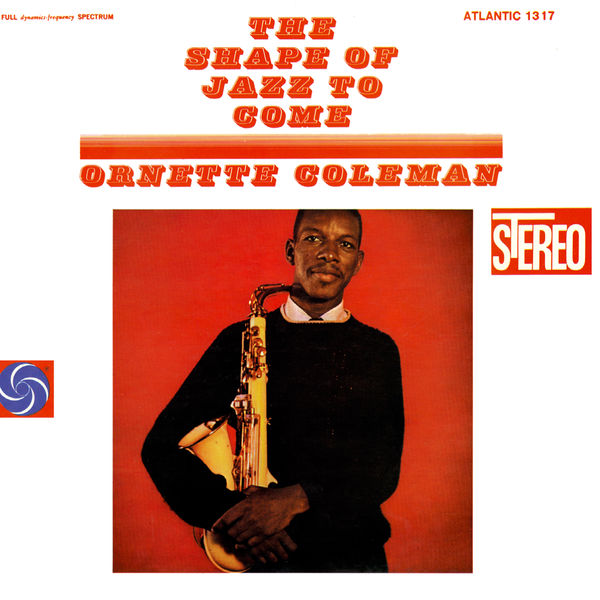
Unlimited Streaming
Listen to this album in high quality now on our apps
Start my trial period and start listening to this albumEnjoy this album on Qobuz apps with your subscription
SubscribeEnjoy this album on Qobuz apps with your subscription
Digital Download
Purchase and download this album in a wide variety of formats depending on your needs.
This album belongs to a time when jazz record executives slapped broad boasts and proclamations onto their products. These usually celebrated the prowess of the artist (Sonny Rollins' Saxophone Colossus) or the potency of the sounds (the Count Basie Orchestra's Atomic Basie). The Shape of Jazz To Come takes that hype up a notch, promoting alto saxophonist Ornette Coleman as no less than the future of the art.
As prophecy goes, the title is spot on. This record introduced Coleman's daring approach to harmony (which he called "harmelodics"), and showed how it stretched common wisdom about consonance and dissonance, structure and openness, hard swing and tempoless contemplation. Coleman and his three agile musicians—trumpeter Don Cherry, bassist Charlie Haden, drummer Billy Higgins; note the absence of a harmony instrument like piano or guitar—engage in a series of squabbling conversations loosely shaped (and occasionally punctuated) by recurring melodic fragments. The ad-libbed motifs dart around corners rapidly; sometimes they bloom and then disappear immediately, sometimes they hang around and mutate as they're volleyed between instrumentalists.
The most famous of these is "Lonely Woman," a sullen Coleman original that's easily his most ubiquitous tune. Following a deliberative bass opening from Haden, Coleman renders it as a study in hanging questions and unresolved mysteries. Other tunes, including "Focus On Sanity" (Coleman's choice for the album title), summon the frenetic energy and taunting fury that soon came to be associated with free jazz. Indeed, it contains maps to the terrain of the future: Historians generally mark this work, which was enshrined in the Library of Congress' National Recording Registry in 2012, as the foundation of the entire jazz avant garde movement. And though the music quickly sprouted more strident modes of expression, this album's forward-hurtling spirit still delivers on the claim of the title. © Tom Moon/Qobuz
You are currently listening to samples.
Listen to over 100 million songs with an unlimited streaming plan.
From £10.83/month

Nesuhi Ertegun, Producer - Billy Higgins, Drums - Ornette Coleman, Composer, Alto Saxophone, MainArtist - Charlie Haden, Double Bass - Don Cherry, Cornet
© 1959 Atlantic Records ℗ 1959 Atlantic Records
Nesuhi Ertegun, Producer - Billy Higgins, Drums - Ornette Coleman, Composer, Alto Saxophone, MainArtist - Charlie Haden, Double Bass - Don Cherry, Cornet
© 1959 Atlantic Records ℗ 1959 Atlantic Records
Nesuhi Ertegun, Producer - Billy Higgins, Drums - Ornette Coleman, Composer, Alto Saxophone, MainArtist - Charlie Haden, Double Bass - Don Cherry, Cornet
© 1959 Atlantic Records ℗ 1959 Atlantic Records
Nesuhi Ertegun, Producer - Billy Higgins, Drums - Ornette Coleman, Alto Saxophone, Writer, MainArtist - Charlie Haden, Double Bass - Don Cherry, Cornet
© 1959 Atlantic Records ℗ 1959 Atlantic Records
Nesuhi Ertegun, Producer - Billy Higgins, Drums - Ornette Coleman, Composer, Alto Saxophone, MainArtist - Charlie Haden, Double Bass - Don Cherry, Cornet
© 1959 Atlantic Records ℗ 1959 Atlantic Records
Nesuhi Ertegun, Producer - Billy Higgins, Drums - Ornette Coleman, Composer, Alto Saxophone, MainArtist - Charlie Haden, Double Bass - Don Cherry, Cornet
© 1959 Atlantic Records ℗ 1959 Atlantic Records
Album review
This album belongs to a time when jazz record executives slapped broad boasts and proclamations onto their products. These usually celebrated the prowess of the artist (Sonny Rollins' Saxophone Colossus) or the potency of the sounds (the Count Basie Orchestra's Atomic Basie). The Shape of Jazz To Come takes that hype up a notch, promoting alto saxophonist Ornette Coleman as no less than the future of the art.
As prophecy goes, the title is spot on. This record introduced Coleman's daring approach to harmony (which he called "harmelodics"), and showed how it stretched common wisdom about consonance and dissonance, structure and openness, hard swing and tempoless contemplation. Coleman and his three agile musicians—trumpeter Don Cherry, bassist Charlie Haden, drummer Billy Higgins; note the absence of a harmony instrument like piano or guitar—engage in a series of squabbling conversations loosely shaped (and occasionally punctuated) by recurring melodic fragments. The ad-libbed motifs dart around corners rapidly; sometimes they bloom and then disappear immediately, sometimes they hang around and mutate as they're volleyed between instrumentalists.
The most famous of these is "Lonely Woman," a sullen Coleman original that's easily his most ubiquitous tune. Following a deliberative bass opening from Haden, Coleman renders it as a study in hanging questions and unresolved mysteries. Other tunes, including "Focus On Sanity" (Coleman's choice for the album title), summon the frenetic energy and taunting fury that soon came to be associated with free jazz. Indeed, it contains maps to the terrain of the future: Historians generally mark this work, which was enshrined in the Library of Congress' National Recording Registry in 2012, as the foundation of the entire jazz avant garde movement. And though the music quickly sprouted more strident modes of expression, this album's forward-hurtling spirit still delivers on the claim of the title. © Tom Moon/Qobuz
About the album
- 1 disc(s) - 6 track(s)
- Total length: 00:38:12
- Main artists: Ornette Coleman
- Composer: Ornette Coleman
- Label: Rhino Atlantic
- Genre: Jazz
© 1959 Atlantic Records ℗ 1959 Atlantic Records. Marketed by Rhino Entertainment Company, a Warner Music Group Company
Distinctions:
Improve album information
 Why buy on Qobuz...
Why buy on Qobuz...
-
Stream or download your music
Buy an album or an individual track. Or listen to our entire catalogue with our high-quality unlimited streaming subscriptions.
-
Zero DRM
The downloaded files belong to you, without any usage limit. You can download them as many times as you like.
-
Choose the format best suited for you
Download your purchases in a wide variety of formats (FLAC, ALAC, WAV, AIFF...) depending on your needs.
-
Listen to your purchases on our apps
Download the Qobuz apps for smartphones, tablets and computers, and listen to your purchases wherever you go.



